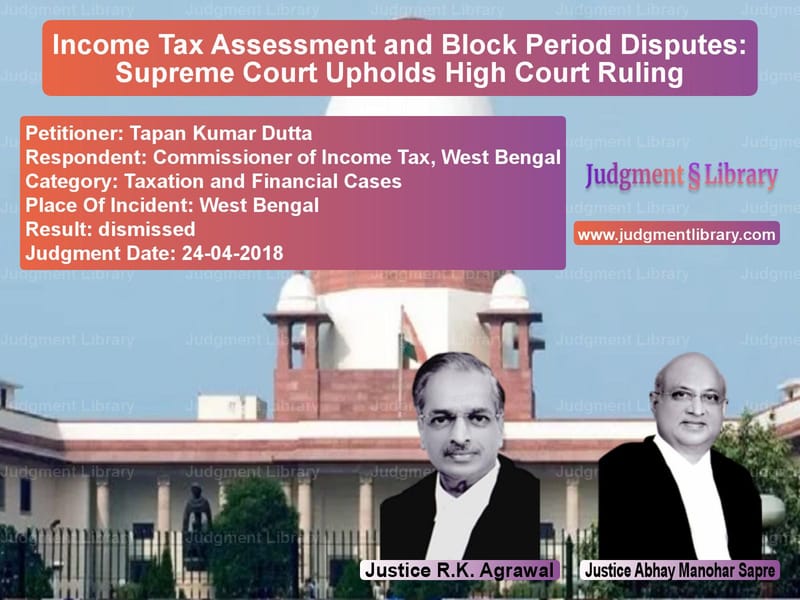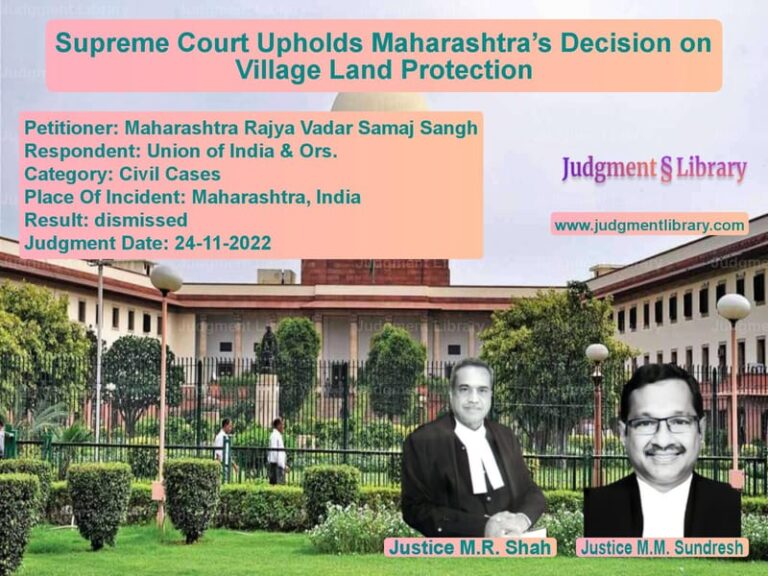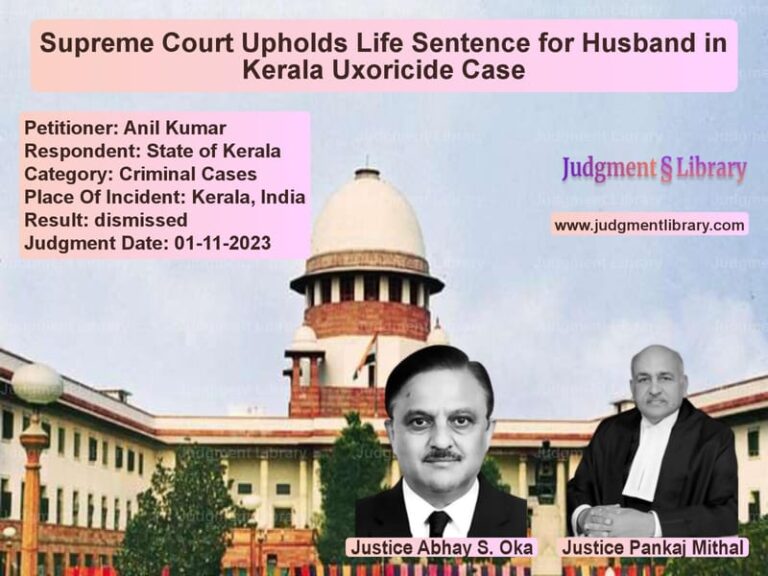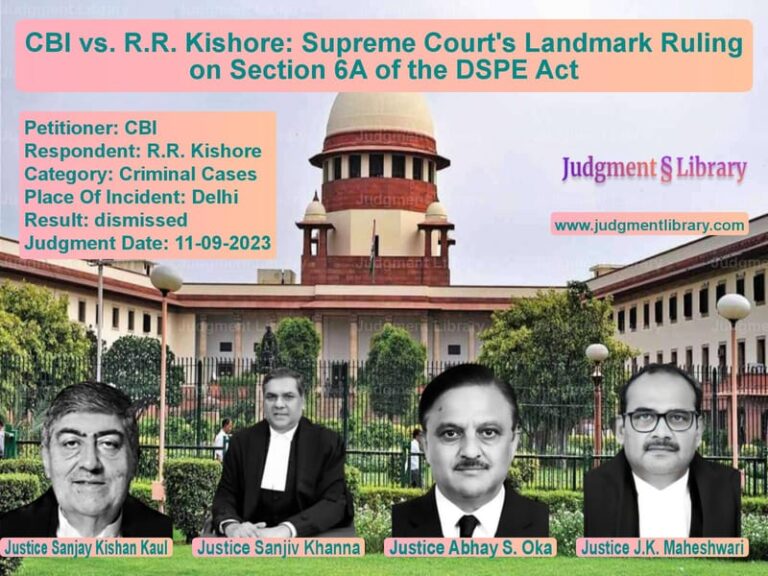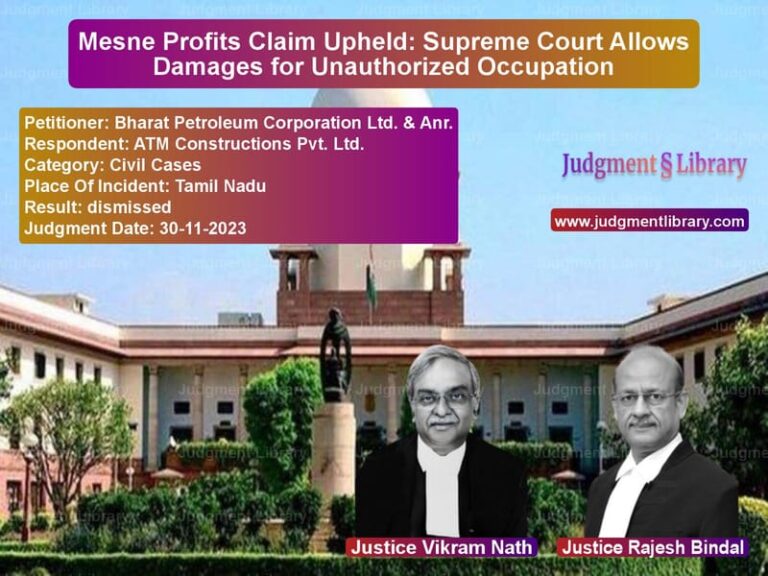Income Tax Assessment and Block Period Disputes: Supreme Court Upholds High Court Ruling
The case of Tapan Kumar Dutta vs. Commissioner of Income Tax, West Bengal revolves around the assessment of undisclosed income under the Income Tax Act, 1961. The Supreme Court was called upon to decide whether the issuance of a second notice under Section 158BD of the Income Tax Act was valid, given that the first notice had already been issued under Section 158BC.
The dispute arose when the Income Tax Department conducted a search on the business premises of Nityakali Rice Mill, a partnership firm in which the appellant was a partner. Several financial documents, books, and an amount of Rs. 34 lakhs were seized during the search. Based on the findings, the Income Tax Department issued notices for block assessment to both the firm and the appellant, leading to a prolonged legal battle.
Background of the Case
The Income Tax Department issued a notice to the appellant on September 9, 1999, under Section 158BC, requiring him to disclose his income for the block period 1989-90 to 1999-2000. On the same day, a similar notice was issued to the firm, Nityakali Rice Mill. The appellant responded by declaring an undisclosed income of Rs. 14 lakhs.
Meanwhile, the Additional Commissioner of Income Tax directed the Assessing Officer to take steps to determine the appellant’s undisclosed income. However, on November 20, 2000, the Income Tax Department issued a second notice under Section 158BD, initiating fresh proceedings against the appellant for the same block period.
Arguments by the Parties
Petitioner’s Arguments (Tapan Kumar Dutta)
The appellant argued that:
- The first notice under Section 158BC was valid, and no fresh notice could be issued under Section 158BD.
- The same Assessing Officer was handling both the firm and the appellant’s assessment, making the second notice unnecessary.
- Section 158BD applies only when the assessing officers for the searched entity and the third party are different.
- Proceedings initiated under Section 158BD were illegal and without jurisdiction.
Respondent’s Arguments (Commissioner of Income Tax, West Bengal)
The Income Tax Department contended that:
- The appellant had engaged in personal business, as evidenced by bank accounts and documents seized during the search.
- Undisclosed income was found in the appellant’s name, necessitating separate assessment under Section 158BD.
- The second notice was valid as it was based on fresh evidence obtained during the assessment.
Supreme Court’s Analysis
The Supreme Court examined the provisions of Sections 158BC and 158BD and the conditions under which fresh notices can be issued. The Court noted:
- Section 158BD allows an Assessing Officer to issue notices to a third party if undisclosed income belonging to that person is found during a search.
- The same officer handling the assessments of both the firm and the individual does not preclude the issuance of a second notice under Section 158BD.
- The satisfaction of the Assessing Officer regarding undisclosed income belonging to the appellant was evident from the seized documents.
- The second notice was issued only after confirming that the appellant’s income needed separate assessment.
Key Observations by the Court
The Supreme Court ruled:
“It is well settled that there must be prima facie satisfaction on the part of the Assessing Officer on the basis of searched books of accounts or other documents or assets that any undisclosed income belongs to any person other than the searched person.”
The Court emphasized that the Assessing Officer had followed due process and acted within the law while issuing the second notice.
Final Judgment
The Supreme Court upheld the High Court’s ruling and dismissed the appeal. It stated:
“The High Court was right in passing the judgment and order dated 17.11.2005, and no interference is sought by this Court. Hence, the appeal is dismissed with no order as to costs.”
Conclusion
This judgment reinforces the principles governing block assessments and the application of Section 158BD in tax proceedings. It clarifies that tax authorities can issue fresh notices if they uncover new evidence of undisclosed income belonging to a third party.
Petitioner Name: Tapan Kumar Dutta.Respondent Name: Commissioner of Income Tax, West Bengal.Judgment By: Justice R.K. Agrawal, Justice Abhay Manohar Sapre.Place Of Incident: West Bengal.Judgment Date: 24-04-2018.
Don’t miss out on the full details! Download the complete judgment in PDF format below and gain valuable insights instantly!
Download Judgment: Tapan Kumar Dutta vs Commissioner of Inco Supreme Court of India Judgment Dated 24-04-2018.pdf
Direct Downlaod Judgment: Direct downlaod this Judgment
See all petitions in Income Tax Disputes
See all petitions in Tax Evasion Cases
See all petitions in Banking Regulations
See all petitions in Judgment by R K Agrawal
See all petitions in Judgment by Abhay Manohar Sapre
See all petitions in dismissed
See all petitions in supreme court of India judgments April 2018
See all petitions in 2018 judgments
See all posts in Taxation and Financial Cases Category
See all allowed petitions in Taxation and Financial Cases Category
See all Dismissed petitions in Taxation and Financial Cases Category
See all partially allowed petitions in Taxation and Financial Cases Category

